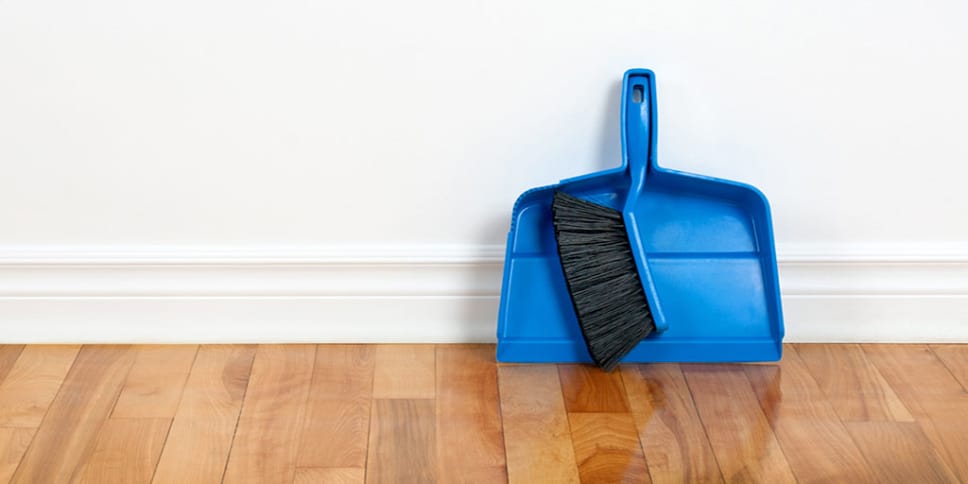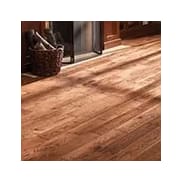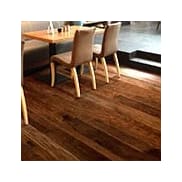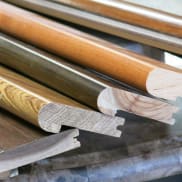How to Care For Hardwood Floors
7 Must-Know Tips Every Homeowner Should Know

Wood is a popular choice for flooring, as it is unique to each home, adds elegance and warmth to any space, and is highly durable and capable of lasting for many generations. In fact, many homes built in the early nineteenth century still have their original with hardwood floors today.
If cared for properly, wood floors are a classic and timeless choice that every homeowner will love. Though, it’s important to note that this type of flooring may take a little extra effort to clean and protect.
To help you maintain their beauty and strength, we’ve compiled a list of a few simple tips that every homeowner can follow to help you care for and protect your floors for many years to come.
1) Sweep & Clean Regularly
A simple way to protect your wood floors is to remember to sweep up regularly. As you walk through your house, even small particles of dust, dirt, gravel, or other debris can lead to unfortunate dents and scratches in the wood. If you can make it a habit to sweep often, you’ll eliminate the various elements that can damage the beauty of your floors.
You should also never let spills sit. As these dry, it’ll become harder and harder to clean, and may result in unsightly stains or spots in the wood. Even the smallest pools of liquid possess a remarkable potential to penetrate the surface and damaged the boards. Clean up any spills and leaks as soon as possible with a soft cloth, and always dry the floor afterwards.
2) Use the Right Vacuum Attachment
Sweeping is the recommended method for cleaning hardwood floors, as broom bristles are softer and less damaging to the surface of the wood. However, you can still use a vacuum cleaner, but it would be wise to use an attachment that is designed for tile and hardwood flooring.
Trying to vacuum with the regular carpet attachment may be too rough and cause scratches in the wood. Most vacuum cleaners will come with, or have available to purchase, an attachment that is specifically designed to be gentle on hardwood floors, while still getting all of the dirt and dust. It is strongly recommended that you use one of these attachments.
3) Swear Off Mopping
Many homeowners simply don’t realize that mopping hardwood floors may cause damage and deformations. Unlike when you’re cleaning other types of flooring, saturating wood in moisture is never a good idea. Depending on the type of flooring you have, the moisture may seep into the wood fibers and cause boards to swell, warp, or twist. If this happens, you may be left with costly repairs.
If your hardwood flooring is in need of a deep clean, use a barely damp rag and then dry floors immediately afterward with a towel. Never let it air dry. It would also be wise to avoid using hot water when cleaning wood floors, lukewarm water will do just fine.
4) Choose Your Cleaners Wisely
No matter what type of flooring you have in your home, it is important to be cautious about what cleaners are used. But, this is especially true with wood floors, where cleanser may strip off the finish or dull the its shine.
There are a number of products that claim to be safe for hardwood floors, but may cause damage with repeated use. If you’re unsure about the quality of the cleaning product you have, check with the manufacturer to ensure its safe to use on wood. You can also read online reviews, or contact a flooring professional in your area to get some extra insight on what cleaners would be best for your home.
As a general rule, avoid cleaners that use vinegar or ammonia, as these highly acidic substances can dull or etch the floor over time. Oil soaps can create buildup on floors that can be difficult to remove, and they, too, can also dull the finish on hardwood.
5) Check Your Shoes at the Door
As soon as you walk in your home, it’s best to remove your shoes and leave them near the door. If you do wear shoes around the house, pay attention to what kind of shoes you wear.
Some types of shoes, such as high heels, can cause significant damage to floors, as the heels can act like tiny hammers as you walk across the wood. Cleats are another culprit that can cause quick damage. When your kids return from soccer or football, their cleats may cause deep scratches and dents, as well as track in a bunch of dirt and other unknown muck.
Leaving your shoes at the door reduces the chances of scratches, dings, and scuffs on your floor, as well as reduces the amount of debris you need to clean-up later on.
6) Purchase Area Rugs & Carpets
Strategically placing rugs and carpets throughout your home can also help protect your wood floors. This is especially true in high traffic areas, such as hallways and entryways. As an alternative to using felt pads underneath the legs of your furniture, you can add an area rug to add style. This not only shields your floors, but also adds a chic splash to your decor.
Another great way to preserve the elegance of your hardwood, is to use a durable doormat in your entryway. This will serve as a “catch-all” spot to prevent dirt, dust, and other debris from entering your home (and wreaking havoc on your floors). It will also be a subtle reminder for family and guests to stop and remove their shoes before proceeding into your home.
7) Safeguard From Scratches
If you have four-legged friends in your home, remember to keep their nails clipped short and filed smooth as their claws can ding wood floors, especially if they are a larger or heavier breed. Cats can cause damage to your flooring as well, so consider using claw caps to prevent this from happening. This can also be a good method of protecting your furniture.
It would also be wise to place felt pads on the bottom of chairs, sofas, and tables to help prevent scratches and scuffs that can occur when furniture is moved or used. Felt pads are available in stick-on versions or tap-in style, and they are an easy and inexpensive way to help protect your floors.
Be mindful of how you move large pieces of furniture or appliances. Even when you’re careful, sliding these heavy items across the your hardwood floors can cause deep scratches. Try to always lift up (with your legs, not your back), instead of pushing it across your floors.
Protect & Preserve for a Lifetime of Happiness
When cared for properly, hardwood floors can last for generations as a beautiful addition to your home, not to mention a very desirable selling point when you decide to sell. Being cautious about how you clean your floors, mindful about how you treat them day-to-day, and consistent with a care schedule, you can help prolong the life of your floors.





